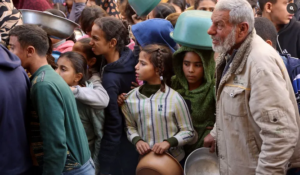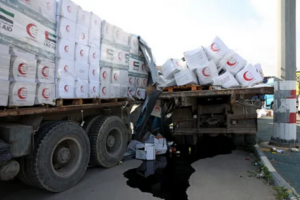Gazans left without humanitarian aid as the Israeli army, Hamas and the UN trade blame

Gazans line up for food at the Al-Shati refugee camp, December 2024
Nir Hasson reports in Haaretz on 13 January 2025:
Humanitarian aid organizations have been arguing for months that the main obstacle to delivering humanitarian aid to the Gaza Strip is the collapse of civil order and the fact that a huge portion of the aid entering Gaza is looted by criminals, either en route to distribution centers or even within the centers themselves.
Organizations point the finger at Israel and the Israel Defense Forces, claiming they fail to prevent the looting and even encourage certain armed groups as part of an effort to bolster families and factions that might collaborate with Israel in the future.
Tom Fletcher, the UN’s Under-Secretary-General for Humanitarian Affairs and Emergency Relief Coordinator, said last week that “there is now a perception that it is dangerous to protect aid convoys but safe to loot them.”
This exceptional statement, even when compared to the negative tone of remarks by senior UN officials over the past year toward Israel, follows a series of IDF strikes that the Palestinians and international organizations claim have targeted those trying to protect the aid convoys.
For its part, the IDF has said it has been working to facilitate the provision of humanitarian assistance in Gaza.
Fletcher’s statement mentions two recent incidents, including one on Friday night, January 3, in which an IDF drone attacked a vehicle in which Palestinian security guards were accompanying a convoy of 74 aid trucks.
Forty-three trucks were reportedly looted, their contents never making it to their intended destination. The IDF said that the attack was targeting “armed Hamas terrorists who exploited routes being used to transfer humanitarian assistance.” The following day, the IDF launched another attack in the Mawasi humanitarian zone, killing two Palestinian police officers, whose primary task, according to officials in Gaza, was to try to protect the aid and to restore civil order.
UN sources claim that according to international law, the police are not considered armed forces and that there is no justification for targeting police officers.
In another incident last week, Israeli soldiers fired at a World Food Program convoy. The convoy, which included three UN vehicles carrying eight World Food Program workers, was shot at by soldiers in a military vehicle about 150 meters (45 feet) from the Netzarim corridor in central Gaza. Although no one was injured, 16 bullets hit vehicles in the convoy.

Aid trucks in the Kerem Shalom border crossing, January 2025
Passage of the convoy had been coordinated in advance with the IDF and the vehicles in it were clearly marked as belonging to the UN. The IDF confirmed the details of the incident and said it is being investigated and that orders to troops have been clarified.
In recent weeks, Gazans have tried to protect the convoys. In one such effort in the southern Strip, several large families announced that their young people would help protect the convoys. Another effort was made by private security firms that were hired by the international organizations.
Officials in Gaza say that there are also still efforts by Hamas’ civil police force to prevent looting of aid. Israeli officials say that Hamas members themselves are looting the aid.
In a number of cases, sources in Gaza claim that the IDF has actually attacked and hit guards protecting the convoys and not looters, adding to the chaos. The Hamas Information Ministry reports that 736 guards and police officers who were involved in protecting the humanitarian assistance have been killed since the beginning of the war on October 7, 2023.
For its part, the UN Office for the Coordination of Humanitarian Affairs said last Wednesday that at least 369 aid workers have been killed since the outbreak of the war.
“These incidents are part of a dangerous pattern of sabotage and deliberate disruption,” Fletcher said last week. “The reality is that despite our determination to deliver food, water, and medicine to survivors, our efforts to save lives are at breaking point. There is no meaningful civil order. Israeli forces are unable or unwilling to ensure the safety of our convoys. Statements by Israeli authorities vilify our aid workers even as the military attacks them. Community volunteers who accompany our convoys are being targeted. There is now a perception that it is dangerous to protect aid convoys but safe to loot them.”
In the meantime, a large quantity of food and other assistance is waiting at the Kerem Shalom border crossing leading from Israel into Gaza and is not getting to those who need it due to repeated incidents of theft.
According to last Wednesday’s statement by the UN Office for the Coordination of Humanitarian Affairs, only 19,000 of 220,000 clothing kits for children that were purchased ahead of winter reached their recipients, due to problems with transportation and distribution. Last week, six fuel tankers were hijacked from the UN, leaving hospitals in the Strip with barely enough fuel in the run-up to the weekend to generate electricity.
The IDF’s spokesperson said in response to this article that “Since the beginning of the war, the IDF has been working in accordance with international law to enable and facilitate the humanitarian response to residents of Gaza in a variety of ways.”
“The Hamas terrorist organization has been acting in violation of international law from inside population centers in the humanitarian zone and adjacent to humanitarian routes. This includes Hamas military terrorists operating on these routes to ensure that the aid gets into Hamas’ hands. In light of this terrorist activity, the IDF has been acting in these zones and using a variety of means, to the extent possible, to minimize the harm to the entry of humanitarian assistance.”
This article is reproduced in its entirety
